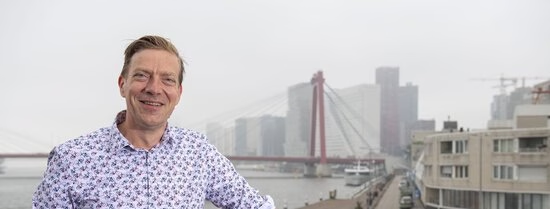“Using scientific arguments to sow doubt in existing systems.” That is what Derk Loorbach (46) likes to do best. As Director of the Dutch Research Institute for Transitions (DRIFT), he enjoys shaking up systems that need change to address sustainability concerns.
DRIFT was established in 2004 and operates as a private limited company under the umbrella of Erasmus University Rotterdam. Using research, consulting, education and the DRIFT Arena (activities for a wider audience), DRIFT aims to speed up changes towards fairer and more sustainable societies. “We bring science out onto the street so we can facilitate change from there. We hold up a mirror to society,” explains Derk.
Interest in transition
Derk Loorbach is Professor of Socio-Economic Transitions at the Erasmus School of Social and Behavioural Sciences. Problems in society are close to his heart. He likes to hold challenges involving sustainability up to the light. Derk recently found a sustainable power assignment dating back to his primary school days. From an early age, he has been interested in transition and how to bring about change.
Close to the real world
Derk has been Director of DRIFT since 2011. He and his colleagues have collaborated on organising academic, critically independent thinking close to the real world. Derk: “Although scientific research often starts with the scientist, we have demonstrated that it can also be done differently. Firstly, we make contact with the real world so we can think and investigate further from that perspective. By doing so, we are able to focus on the issues that are relevant to society. We look for practical answers to the issues that are challenging society. I am a huge supporter of giving this way of conducting research more opportunity at EUR.”
Boiling water
His research focuses on transitions: the kind of societal changes that take place slowly and you often only recognise afterwards. For example, in the twentieth century we gradually switched from coal to gas, from horses to cars and from district nursing to hospital care. These are all processes that followed a certain pattern with the occasional jolt. It is precisely this pattern that is of interest to the researchers at DRIFT. Derk: “I often compare it with boiling water. It starts with water, but something changes when we do something like add heat. Although to start with you might see very little change from the outside, something is certainly happening at a micro-level. And then you pass the point at which the change becomes noticeable: the water becomes steam. It is the same with systems. Due to external influences such as technology or a certain type of behaviour, systems can change in accordance with a certain pattern: they become unbalanced. At DRIFT, we are committed to speeding up the transitions that are needed in areas such as sustainability because fortunately, we are not frogs that don’t realise the water they are in is heating up.”
IABR
This year, Derk Loorbach was appointed as Chief Curator of the 2022 International Architecture Biennale Rotterdam (IABR), entitled ‘SHOCK & ROLL’. “Besides transition practices, we will add design and research and show the results to a large audience because the climate targets clearly show that we are going to have to do things differently. Are we going to have to build more roads if the traffic jams in the Netherlands increase? Or are we finally going to examine the problem behind the traffic jams? With practical solutions in daily life, SHOCK & ROLL will make transitions visible and speed them up. Finally, this practical experience will also be a source of information we can use in our research into hastening changes!”
More information about IABR: https://iabr.nl/nl
- Professor

